Text
'Why are the streets always deserted?’ she asked.
‘If you hold open the shutter long enough, everything moving disappears.’ Or leaves only a trace—a clouding of the air, a thickening of the light, the breath of absence.
She thought several things then. That a photographer’s entire life’s work would add up to only a few minutes of time. And that one could make a long exposure—say, thirty years of married life, or family life in a kitchen, infants growing to adults – and all that the photographic plate would show was an empty room. But it would not be empty, instead it would be full of life, invisible and real. And then she thought, someday she would look in the mirror and see only the empty room behind her. And then: with a very, very long exposure—say, perhaps, eternity—perhaps we reappear.
— Anne Michaels, Held
1 note
·
View note
Text
At the border, the train station—sprawling, with turrets and domes like a cathedral—had a hyphenated name, to clarify not that it was both places at once, but neither on place nor the other. [...]
Limit is proof of the beyond. Not the self, but what lies beyond the self. He would not be surprised if physics made sense of it someday; but only because science is bent on proving it doesn't exist. Scientists will rip us to shreds looking for it, but it will not be found where they are looking. He remembered a joke, about someone who'd lost something and was searching across the street, under a streetlamp. Why are you looking for it there? Because the light is better.
— Anne Michaels, Held
0 notes
Text
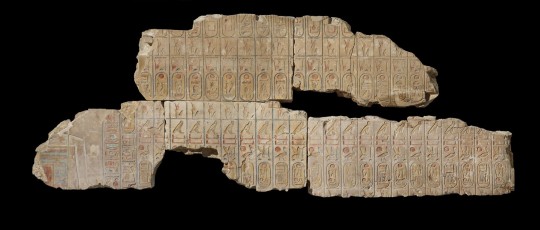
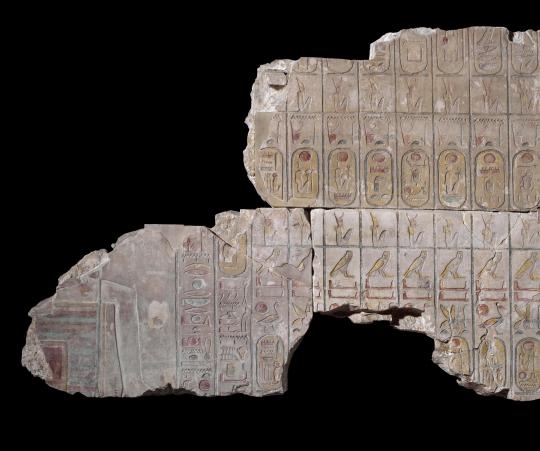
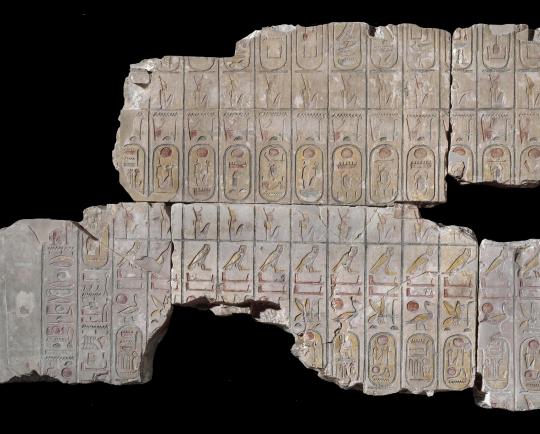
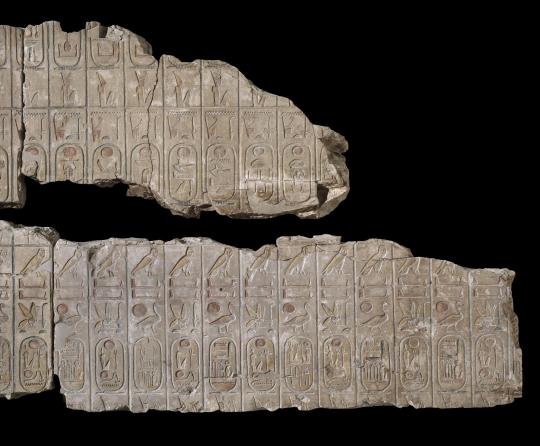
~ King-list comprising 34 names.
Period: 19th Dynasty
Date: 1250 B C.
Place oforigin: Upper Egypt: Temple of Ramses II (Abydos)
Medium: Limestone
544 notes
·
View notes
Text
Places described by a lover are like no other places on earth. To learn a city in this way—boulevards curving, canals, cornices overhead—in the naked embrace, the luxury of listening while your skin is listening. The city slips into your body. And then, if you are fortunate enough to arrive there for the first time with that same lover, or more fortunate still to arrive there after many years with the same lover—then you will enter the place as if in a dream. Your body will recognise the canals, the cornices, the curving boulevards; memory before sight. And that is a great gift, because we arrive most often as strangers; this, of course, is its own pleasure. But this other pleasure —arrival into the memory of a place you’ve never been and yet know in your skin—is the same as arriving into love, that knowledge of something we do not yet know. The kind of love that is like a fatality. The one you never live beyond, no matter what else befalls you.
— Anne Michaels, Held
2 notes
·
View notes
Text
Mountain hut booked: looking forward to watching the sunrise from Mt. Fuji's peak on the morning of my 30th birthday.
8 notes
·
View notes
Text

Mount Fuji seen from the International Space Station.
13 notes
·
View notes
Note
Hi Lana - How've you been? Wondering what a typical day is like for you?
Hello! Apologies for taking so long to respond—I have been really well, thank you for asking!
I wonder if you'll find my day-to-day life quite boring. I'm a serial planner and my schedule depends on the day of the week, but a typical Monday looks like:
4:45 - wake; stretch; run 5km in the park
5:30 - brush teeth; shower; get ready for work (skincare routine, get dressed, style hair, make-up...); breakfast, coffee, and listen to the daily news
6:40 - leave for work; listen to music or a podcast while walking to/through stations; study Japanese (Anki flashcards) while on the train
7:40 - arrive at workplace; check email
17:00 - leave workplace; listen to music or a podcast while walking to/through stations, study Japanese (Anki flashcards) while on the train (when finished flashcards, I usually just read or message friends/family)
18:00 - arrive home; change into yoga wear; clean up (I set a timer for 15min and go about organizing belongings from my work bag, doing a load of laundry, wiping surfaces, tidying up anything out of place etc. until the timer goes off)
18:20 - workout (legs, glutes); stretch; shower
19:00 - change into loungewear; eat dinner (usually prepared the day before)
19:15 - prepare work bag for the next day (make sure electronic devices are all charged/clothing is steamed/lunch is prepared etc.); wash any dishes left in the sink; read a book or watch an episode of a TV show
20:30 - change into pyjamas; skincare routine; brush and floss teeth
20:45 - respond to messages/emails I procrastinated on replying to
21:00 - sleep
#I'm flexible though—I work near Shinjuku so some evenings I'll linger in the area for dinner/a drink/shopping...#personal
9 notes
·
View notes
Text

St. Vincent by Janette Beckman
356 notes
·
View notes
Text
Cooking is not about convenience and it's not about shortcuts. Our hunger for the twenty-minute gourmet meal, for one-pot ease and prewashed, precut ingredients has severed our lifeline to the satisfactions of cooking. Take your time. Take a long time. Move slowly and deliberately and with great attention.
Thomas Keller, The French Laundry Cookbook
914 notes
·
View notes
Text
[A critic is] someone who […] loves experience. I think it’s a disposition that comes even before attention to art. It is someone that looks at any phenomena and wants to extend their life by paying attention—by analysis—[by wanting] to juice this aspect of experience for all that it’s worth. Someone who is, in one way, battling death by saying I can extend this moment, and this one, and this one by way of attention. And so the best way to practice that disposition happens to be on art and therefore, [the critic] uses their taste, uses their standards, uses their whole apparatus of judgement, really, to express a kind of joy of being alive at the same time as the thing.
— Vinson Cunningham's response to the question, "What is the work of a critic today?" on The New Yorker's Critics at Large podcast
#Vinson Cunningham#art criticism#The New Yorker#Critics at Large#I've been thinking about this description all day
29 notes
·
View notes
Text
A leaf falls here/there, now/then
behind the rain, a curtain of rain,
the trees in their own time.
I see now that time falls in layers.
— Elisa Gabbert, "Life Poem I," featured in The Paris Review
3 notes
·
View notes
Photo
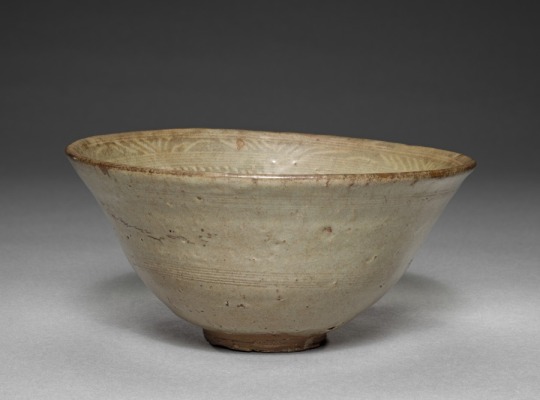
Bowl with Stamped Floral Decoration, 1400s, Cleveland Museum of Art: Korean Art
Size: Overall: 8.8 cm (3 7/16 in.)
Medium: glazed ceramic
https://clevelandart.org/art/1988.1057
8 notes
·
View notes
Text
[...] but schools serve the political and economic order in which they operate, and whether they deserve a passing or a failing grade begs the prior question asking what it is they're supposed to teach. The answers change with time and circumstance. The curriculum proposed by Plato forbade the reading of poetry apt to "give a distorted image of the nature of the gods and heroes"; Castiglione offered instruction in a "certain nonchalance" likely to win favour of a Medici prince or a Borgia duke; John Milton believed "the end of learning" to be the knowledge and love of God. When Yale College in 1701 set itself up as a vessel of the true Puritan faith in the Connecticut wilderness, it undertook to supply the colony's churches with an orthodox ministry, and to bestow upon its graduates the warrants of Christian character and spiritual worth. Thomas Jefferson in 1819 established the University of Virginia to develop "the reasoning faculties of our youth," to improve in its nature what "was vicious and perverse" and by so doing to advance "the prosperity, the power, and the happiness of a nation."
— Lewis H. Lapham, "Playing with Fire," preamble to Lapham’s Quarterly Fall 2008 issue: “Ways of Learning”
3 notes
·
View notes
Text

Morning rain at Ryoanji temple in Kyoto (龍安寺, 京都)
14 notes
·
View notes

